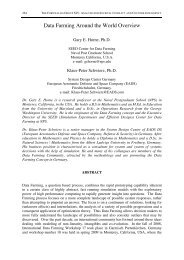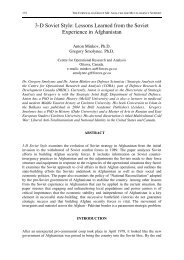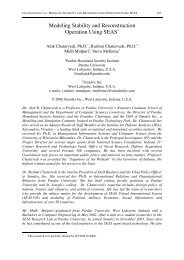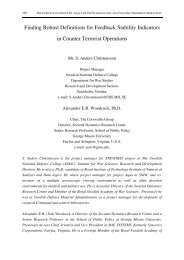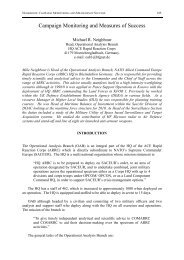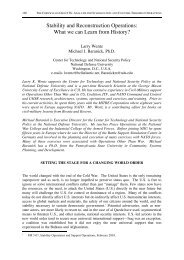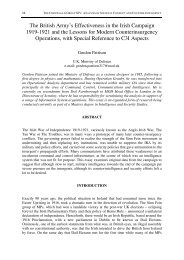The Human Terrain of Counterinsurgency ... - Cornwallis Group
The Human Terrain of Counterinsurgency ... - Cornwallis Group
The Human Terrain of Counterinsurgency ... - Cornwallis Group
Create successful ePaper yourself
Turn your PDF publications into a flip-book with our unique Google optimized e-Paper software.
Analysis for the Future <strong>of</strong> Afghanistan:<br />
<strong>The</strong> <strong>Human</strong> <strong>Terrain</strong> <strong>of</strong><br />
<strong>Counterinsurgency</strong> Operations:<br />
Analysis <strong>of</strong> the Socio-Cultural<br />
Environment<br />
Amy de Vries<br />
Social & Behavioural Science Team, Dstl<br />
Afghan <strong>Counterinsurgency</strong> Centre, Land Warfare Centre<br />
amdevries@dstl.gov.uk / amy.devries977@land.mod.uk<br />
© Crown copyright yyyy. Published with the<br />
permission <strong>of</strong> the Defence Science and Technology<br />
Laboratory on behalf <strong>of</strong> the Controller <strong>of</strong> HMSO.
Outline<br />
• Roles and Background<br />
• <strong>The</strong> Afghan <strong>Counterinsurgency</strong> Centre<br />
– Objectives <strong>of</strong> the ACC<br />
– <strong>Counterinsurgency</strong> Principles<br />
– ‘Understanding the <strong>Human</strong> <strong>Terrain</strong>’<br />
• Socio-cultural analysis<br />
– Developing Cultural Competency<br />
– ‘Reach-back’ Support to Operations<br />
– Analysis from an Afghan Perspective<br />
– Alternative, Novel, and Best Use <strong>of</strong> Available Data<br />
• Analysis for the future <strong>of</strong> Afghanistan?<br />
• Questions<br />
24 October 2010<br />
© Dstl 2010<br />
UNCLASSIFIED<br />
Dstl is part <strong>of</strong> the<br />
Ministry <strong>of</strong> Defence
Roles and Background<br />
• Social / Cultural Research Psychologist<br />
• Applied social science research with Dstl since 2004<br />
• Operational Analyst on Herrick 10 (June – Oct 09)<br />
• Currently seconded to Afghan <strong>Counterinsurgency</strong> Centre<br />
(ACC).<br />
24 October 2010<br />
© Dstl 2010<br />
UNCLASSIFIED<br />
Dstl is part <strong>of</strong> the<br />
Ministry <strong>of</strong> Defence
UK-Based Afghan <strong>Counterinsurgency</strong><br />
(COIN) Centre<br />
As a world class centre <strong>of</strong><br />
<strong>Counterinsurgency</strong>/Stabilisation<br />
Operations (S0) excellence,<br />
Analyse, Develop, Educate,<br />
Advocate COIN/SO theory,<br />
doctrine and best practice in<br />
order to optimise the Field Army<br />
for performance on operations.<br />
24 October 2010<br />
© Dstl 2010<br />
UNCLASSIFIED<br />
Dstl is part <strong>of</strong> the<br />
Ministry <strong>of</strong> Defence
Afghan COIN Centre Objectives<br />
• ANALYSE<br />
– Systematically collect and analyse COIN/SO thinking, developments<br />
and best practice, both within the Army and Joint, Interagency,<br />
Intergovernmental and Multinational partners<br />
• DEVELOP<br />
– Develop optimal COIN/SO theory, doctrine and best practise<br />
• EDUCATE<br />
– Improve knowledge and understanding <strong>of</strong> COIN/SO in the Land<br />
environment by assessing, influencing and supporting the construction<br />
and delivery <strong>of</strong> education and training<br />
• ADVOCATE<br />
– Promote COIN/SO thinking, doctrine and best practice by presenting,<br />
publishing and networking to demonstrate the Army’s commitment to<br />
the development <strong>of</strong> COIN/SO<br />
24 October 2010<br />
© Dstl 2010<br />
UNCLASSIFIED<br />
Dstl is part <strong>of</strong> the<br />
Ministry <strong>of</strong> Defence
Areas <strong>of</strong> Work<br />
• Understanding <strong>of</strong> the human terrain<br />
• Securing the population (physically and psychologically)<br />
• Partnering Afghan forces<br />
• Escalation <strong>of</strong> force<br />
• Engagement with females<br />
• Religious engagement<br />
• Reintegration <strong>of</strong> the Taliban<br />
• Police development<br />
• Counter-corruption<br />
• And more…<br />
24 October 2010<br />
© Dstl 2010<br />
UNCLASSIFIED<br />
Dstl is part <strong>of</strong> the<br />
Ministry <strong>of</strong> Defence
COIN Principles<br />
Primacy <strong>of</strong><br />
Political<br />
Purpose<br />
Unity <strong>of</strong> Effort<br />
Understand the<br />
<strong>Human</strong> <strong>Terrain</strong><br />
Secure the<br />
Population<br />
Neutralize the<br />
Insurgent<br />
Gain and Maintain<br />
Popular Support<br />
Operate in accordance<br />
With the Law<br />
Integrate Intelligence<br />
Prepare for the<br />
Long Term<br />
Learn and<br />
Adapt<br />
24 October 2010<br />
© Dstl 2010<br />
UNCLASSIFIED<br />
Dstl is part <strong>of</strong> the<br />
Ministry <strong>of</strong> Defence
Understanding <strong>of</strong> the <strong>Human</strong><br />
<strong>Terrain</strong><br />
• You must understand your Operational Environment…<br />
Intimate knowledge <strong>of</strong> the <strong>Human</strong> <strong>Terrain</strong> is<br />
paramount…Know the society’s leadership systems;<br />
learn the governance structures…Understand the<br />
familial, clan and tribal cultures…the relationships and<br />
tensions among the separate groups…this gives us<br />
understanding from the point <strong>of</strong> view <strong>of</strong> the population,<br />
insurgent and counterinsurgent<br />
[COMISAF]<br />
24 October 2010<br />
© Dstl 2010<br />
UNCLASSIFIED<br />
Dstl is part <strong>of</strong> the<br />
Ministry <strong>of</strong> Defence
<strong>The</strong> <strong>Human</strong> <strong>Terrain</strong> (HT)<br />
• Political, economic, and social organisations<br />
• Interactions between individuals and groups, and<br />
interactions with their environment<br />
• Beliefs, values, norms in behaviour<br />
= <strong>The</strong> population and their environment<br />
24 October 2010<br />
© Dstl 2010<br />
UNCLASSIFIED<br />
Dstl is part <strong>of</strong> the<br />
Ministry <strong>of</strong> Defence
Implementing Military Understanding<br />
<strong>of</strong> the <strong>Human</strong> <strong>Terrain</strong><br />
• UK Tactical Doctrine (due April 10) on:<br />
– Why understanding is important to the military<br />
• Critical to successful COIN operations<br />
– Developing understanding<br />
• Training<br />
• <strong>Human</strong> <strong>Terrain</strong> Analysis<br />
– Using an understanding <strong>of</strong> the human terrain<br />
• Planning and decision making<br />
• Guide behaviour<br />
• Measuring impact and moderating effect<br />
Changing military mindset<br />
24 October 2010<br />
© Dstl 2010<br />
UNCLASSIFIED<br />
Dstl is part <strong>of</strong> the<br />
Ministry <strong>of</strong> Defence
Why Understand the <strong>Human</strong> <strong>Terrain</strong>?<br />
• Understand why the population behaves the way they do and better<br />
anticipate responses<br />
• Understanding how to develop strategies that receive the support <strong>of</strong> the local<br />
population<br />
• Understand why our behaviour is having an impact (intended and<br />
unintended) on the behaviours and perceptions <strong>of</strong> the local population<br />
• To distinguish and isolate insurgents from the population<br />
• To communicate more effectively with the population and promote shared<br />
understanding <strong>of</strong> intent<br />
= Harness messages and activities to conduct ‘better’ counterinsurgency<br />
= Enable access to the population, understanding <strong>of</strong> cultural centres <strong>of</strong> gravity<br />
= Create a stable and secure environment that can function under the<br />
governance <strong>of</strong> Afghanistan; ‘<strong>The</strong> Future <strong>of</strong> Afghanistan’<br />
24 October 2010<br />
© Dstl 2010<br />
UNCLASSIFIED<br />
Dstl is part <strong>of</strong> the<br />
Ministry <strong>of</strong> Defence
Developing understanding <strong>of</strong> the HT<br />
• <strong>Counterinsurgency</strong> training and revision to cultural briefs<br />
– <strong>Human</strong> <strong>Terrain</strong> critical to all.<br />
• Cultural Competency Training<br />
– CULADs, Cultural Specialists, Influence Officers, Commanders<br />
• <strong>Human</strong> <strong>Terrain</strong> Analysis<br />
– Requirement - Collection - Fusion - Assessment - Product and<br />
Dissemination<br />
– Developing tools and techniques<br />
– ‘Operationalising’ culture/ human terrain.<br />
24 October 2010<br />
© Dstl 2010<br />
UNCLASSIFIED<br />
Dstl is part <strong>of</strong> the<br />
Ministry <strong>of</strong> Defence
Using an Understanding <strong>of</strong> the<br />
<strong>Human</strong> <strong>Terrain</strong><br />
• Planning and Decision-Making<br />
– Pre-planning and information gathering<br />
– Integration into operational planning<br />
– Direct advice to commanders<br />
• Guide Behaviour<br />
– Situational Awareness<br />
– Advice to unit engagements<br />
– Partnering Host Nation Forces<br />
– Use <strong>of</strong> kinetic and non-kinetic force<br />
• Measure and Moderate Effect<br />
24 October 2010<br />
© Dstl 2010<br />
UNCLASSIFIED<br />
Dstl is part <strong>of</strong> the<br />
Ministry <strong>of</strong> Defence
Measuring Impact and Moderating<br />
Effect<br />
• Campaign continuity and corporate knowledge<br />
• Confidence in effect<br />
– Sustaining good COIN practice at Brigade and individual level<br />
• Monitor progress and adapt approach<br />
– Informed metrics <strong>of</strong> effect and performance (MoE, MoPs)<br />
– Implementing successful strategies to achieve objectives<br />
• Inform force development<br />
– Training, education, best practice<br />
24 October 2010<br />
© Dstl 2010<br />
UNCLASSIFIED<br />
Dstl is part <strong>of</strong> the<br />
Ministry <strong>of</strong> Defence
Requirement for Socio-Cultural<br />
Expertise<br />
• HT mindset critical but not sufficient to achieve effect:<br />
– What information to attend to?<br />
– How to interpret information?<br />
– How to integrate information with other forms <strong>of</strong> information/<br />
intelligence?<br />
– Who needs what information?<br />
– How does it/ does it support COIN?<br />
– How do we know what we don’t know?<br />
= Requirement for socio-cultural analysis / expertise to provide<br />
guidance<br />
24 October 2010<br />
© Dstl 2010<br />
UNCLASSIFIED<br />
Dstl is part <strong>of</strong> the<br />
Ministry <strong>of</strong> Defence
Dstl Socio-Cultural Support<br />
• Wide range <strong>of</strong> work, some examples:<br />
– Support to Cultural Capability Training<br />
– Reach-back support to operations<br />
– Development <strong>of</strong> influence tools and techniques<br />
– Social Network Analysis tool development<br />
– ARIA – Suite <strong>of</strong> tools for supporting representation <strong>of</strong> actors in<br />
training and exercises<br />
– Understanding ‘How Social Change Occurs’<br />
– <strong>The</strong> ‘Afghan Perspective’<br />
– Alternative and novel data sources for analysis<br />
24 October 2010<br />
© Dstl 2010<br />
UNCLASSIFIED<br />
Dstl is part <strong>of</strong> the<br />
Ministry <strong>of</strong> Defence
Developing Military Cultural<br />
Competency<br />
• Developing capacity for military to conduct socio-cultural<br />
analysis<br />
– Social science research methodologies<br />
– Principles <strong>of</strong> influence, engagement, and understanding human<br />
dynamics<br />
– Knowledge <strong>of</strong> Afghan culture<br />
• Development <strong>of</strong> human terrain tool-kit<br />
– Assessment tools e.g. Belief Mapping, individual pr<strong>of</strong>iling<br />
• Cultural Competency for Partnering Afghan Security<br />
Forces<br />
24 October 2010<br />
© Dstl 2010<br />
UNCLASSIFIED<br />
Dstl is part <strong>of</strong> the<br />
Ministry <strong>of</strong> Defence
Socio-Cultural Support to Operations<br />
• Provision <strong>of</strong> applied socio-cultural research support to current<br />
operations ‘Reach-back’<br />
– Short-term research outputs (< 3 weeks) in response to theatre<br />
RFIs<br />
– Exploitable<br />
– Interpreting question and translating social science theory into<br />
operational reality<br />
• In-theatre socio-cultural analysis<br />
– Developing Operational Analysis expertise<br />
• Developing MoD Socio-cultural expertise and mentality<br />
– Acceptable level <strong>of</strong> analysis<br />
– Confidence in providing advice<br />
– Broad range <strong>of</strong> disciplines - psychology, sociology,<br />
anthropology, political science…<br />
24 October 2010<br />
© Dstl 2010<br />
UNCLASSIFIED<br />
Dstl is part <strong>of</strong> the<br />
Ministry <strong>of</strong> Defence
Analysis from an Afghan<br />
Perspective<br />
• Focus groups with Afghan National<br />
Security Forces<br />
• Examining ‘Afghan Ways <strong>of</strong> Working’<br />
• Afghan social science research and<br />
theories <strong>of</strong> behaviour<br />
24 October 2010<br />
© Dstl 2010<br />
UNCLASSIFIED<br />
Dstl is part <strong>of</strong> the<br />
Ministry <strong>of</strong> Defence
Analysis from an Afghan<br />
Perspective<br />
• What does the future look like and how can we get there?<br />
• How can we engage and influence the local population?<br />
• What are the preferred social structures and cultural values that<br />
support long-term security and stabilisation?<br />
• What are we doing wrong?<br />
• How/ does this differ from current assumptions?<br />
• Is change required at the tactical/ operational level?<br />
• Does/ will this impact on achieving strategic objectives?<br />
24 October 2010<br />
© Dstl 2010<br />
UNCLASSIFIED<br />
Dstl is part <strong>of</strong> the<br />
Ministry <strong>of</strong> Defence
Alternative, Novel, and Best Use <strong>of</strong><br />
Available Data-Sets<br />
• Rationale<br />
– ‘Focus on the Population’<br />
– Flynn ‘Fixing Intel’<br />
– Amount <strong>of</strong> data not the issue<br />
• Data e.g.<br />
– Patrol reports<br />
– Key Leader Engagement<br />
– ‘Atmospherics’ reporting<br />
– Video footage<br />
– Insurgent produced material<br />
24 October 2010<br />
© Dstl 2010<br />
UNCLASSIFIED<br />
Dstl is part <strong>of</strong> the<br />
Ministry <strong>of</strong> Defence
‘Focus on the Population’ Data-Sets<br />
• Analysis<br />
– What data is available to increase understanding <strong>of</strong> the<br />
population/ HT?<br />
– How is / is data currently being used?<br />
– <strong>The</strong>matic/content analysis <strong>of</strong> data sources from social science<br />
perspective.<br />
• Output<br />
– Utility <strong>of</strong> data sets<br />
– Options and guidance for exploiting content <strong>of</strong> data sets<br />
operationally to achieve:<br />
• Long term objectives<br />
• Short-term goals<br />
24 October 2010<br />
© Dstl 2010<br />
UNCLASSIFIED<br />
Dstl is part <strong>of</strong> the<br />
Ministry <strong>of</strong> Defence
Insurgent Produced Data-Sets<br />
• Open source, insurgent produced material<br />
• Understanding the insurgents as part <strong>of</strong><br />
the HT<br />
– How do they influence the population<br />
(implicitly and explicitly)?<br />
– How do they harness aspects <strong>of</strong> the HT to<br />
achieve effect?<br />
– What are their views on reintegration?<br />
– How is insurgent doctrine evolving in response<br />
to ISAF activities and doctrine?<br />
– How is /is the future <strong>of</strong> Afghanistan influenced<br />
by global reach <strong>of</strong> the insurgency?<br />
24 October 2010<br />
© Dstl 2010<br />
UNCLASSIFIED<br />
Dstl is part <strong>of</strong> the<br />
Ministry <strong>of</strong> Defence
Analysis for the Future <strong>of</strong><br />
Afghanistan?<br />
• Analysis for the future <strong>of</strong> Afghanistan dependent upon:<br />
– Developing military capability and willingness to conduct<br />
counterinsurgency operations<br />
• ‘Understanding the <strong>Human</strong> <strong>Terrain</strong>’<br />
• Ability to measure and moderate impact for long-term effect<br />
– Provision <strong>of</strong> immediate and longer term socio-cultural analysis<br />
to support the military in conducting successful<br />
counterinsurgency<br />
• Guidance on collection, analysis and exploitation <strong>of</strong> sociocultural<br />
data<br />
• Making good use <strong>of</strong> existing data<br />
– Understanding what the future <strong>of</strong> Afghanistan would look like<br />
from an Afghan perspective, and how that can best be achieved<br />
24 October 2010<br />
© Dstl 2010<br />
UNCLASSIFIED<br />
Dstl is part <strong>of</strong> the<br />
Ministry <strong>of</strong> Defence
QUESTIONS?<br />
24 October 2010<br />
© Dstl 2010<br />
UNCLASSIFIED<br />
Dstl is part <strong>of</strong> the<br />
Ministry <strong>of</strong> Defence



